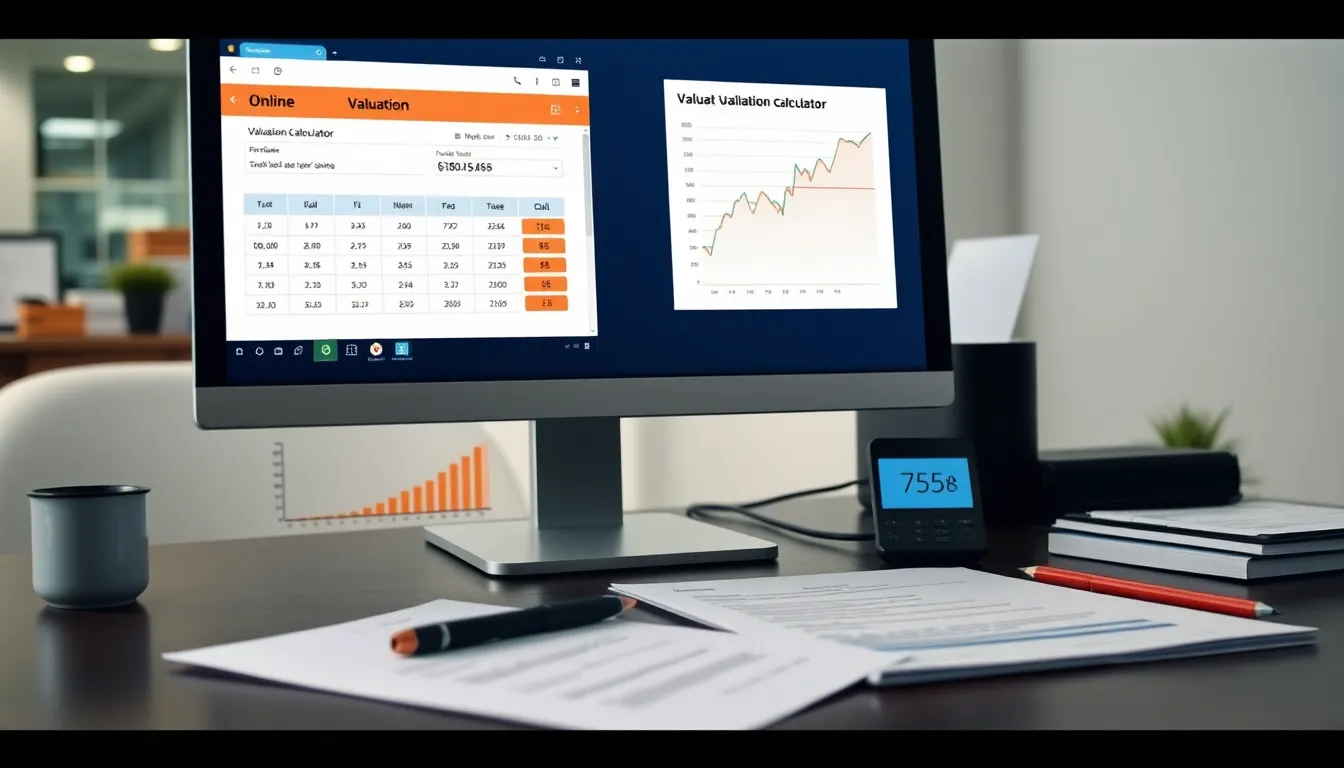In a world where numbers dance and spreadsheets reign supreme, the valuation calculator emerges as the unsung hero of financial decision-making. Whether you’re a savvy investor or a budding entrepreneur, understanding the worth of your assets can feel like deciphering hieroglyphics. But fear not! This handy tool simplifies the complex, turning daunting calculations into child’s play.
Table of Contents
ToggleOverview of Valuation Calculators
Valuation calculators serve as essential tools for evaluating asset worth. They support both investors and entrepreneurs by simplifying intricate financial assessments.
What Is a Valuation Calculator?
A valuation calculator estimates the market value of various assets. Common assets include businesses, real estate, and investments. Often, this tool uses specific inputs like revenue, expenses, and growth rates to generate an estimated value. Users can benefit from its features, making financial analysis more approachable for non-experts.
How Valuation Calculators Work
Valuation calculators operate through algorithms that process user input. Users typically enter data concerning the asset’s financial performance. Algorithms then apply predefined formulas to calculate the value. Most calculators offer multiple methods, including discounted cash flow and asset-based approaches. The output provides users with a reliable estimate of the asset’s value, aiding informed decision-making.
Types of Valuation Calculators

Valuation calculators come in various forms, serving diverse needs across different scenarios. Understanding the distinctions enhances their practical applications.
Online vs. Offline Calculators
Online calculators offer convenience and accessibility, allowing users to input data anytime and anywhere. These tools often include up-to-date market data, ensuring accuracy in calculations. Offline calculators, however, provide a dedicated space for analysis without needing an internet connection. Users value privacy and security when handling sensitive financial information. Both options cater to different preferences, enabling users to select based on their comfort and requirements.
Industry-Specific Valuation Tools
Industry-specific calculators address unique valuation challenges across sectors, enhancing accuracy and relevance. Real estate calculators focus on property-specific metrics like location and market trends. In contrast, business valuation tools consider factors such as revenue streams and market conditions particular to certain industries. Each tool leverages contextual data, ensuring that users receive tailored estimates applicable to their fields. Utilizing these specialized calculators fosters informed decision-making and strategic planning.
Key Features to Look For
Valuation calculators offer various features that enhance usability and accuracy. Focusing on these key aspects helps users select the right tool for their financial needs.
User Interface and Ease of Use
A clean interface makes navigation straightforward. Look for calculators that allow users to input data without confusion. Intuitive design elements, like tooltips and step-by-step guidance, can simplify complex calculations. User-friendly features often include dropdown menus and pre-filled examples, promoting efficiency. Accessibility across devices also enhances usability, ensuring that calculations can occur on desktops, tablets, or smartphones.
Accuracy and Data Sources
Accurate valuation relies heavily on reliable data sources. Trustworthy calculators use verified financial data, ensuring precision in output. Algorithms should incorporate real-time market information to reflect current trends. They often use credible databases for revenue figures, growth rates, and expense benchmarks. A reputation for accuracy sets some calculators apart, making them more dependable for critical financial decisions. Regular updates also play a role in maintaining data integrity, as market conditions can change quickly.
Benefits of Using a Valuation Calculator
Valuation calculators offer significant advantages that enhance financial assessments. Users can experience major benefits in time efficiency and improved decision making.
Time Efficiency
Time savings are a primary benefit of using a valuation calculator. Users can quickly input data and receive results within moments, which contrasts with traditional manual calculations that consume more time. Automated processes streamline complex calculations that typically involve intricate formulas. By reducing time spent on assessments, users can allocate more resources towards strategic planning and implementation. Increased speed leads to quicker analysis of multiple assets, allowing for more informed choices in various financial scenarios.
Improved Decision Making
Improved decision making arises from the reliable outputs generated by valuation calculators. Access to accurate asset valuations enables users to evaluate options with greater confidence. By presenting data in user-friendly formats, these tools simplify the interpretation of financial metrics. Users gain insights into potential investments, pricing strategies, and market trends that influence decisions. Enhanced understanding of asset worth contributes to strategic initiatives, ensuring users make choices aligned with their goals and objectives.
Valuation calculators are indispensable tools that empower users to navigate the complexities of asset valuation with ease. By providing quick and reliable estimates, these calculators enhance the decision-making process for both investors and entrepreneurs. Whether through online or offline platforms, their ability to deliver accurate and tailored assessments ensures users can make informed financial choices.
The efficiency and user-friendly design of these tools further streamline the valuation process, allowing for rapid analysis of multiple assets. With the right features and dependable data sources, valuation calculators not only simplify calculations but also bolster confidence in financial decisions. Embracing this technology can lead to strategic advantages in today’s competitive landscape.




